Welcome to HGSF-Global.org/ghana
Ghana and ten other African countries have met Millennium Development Goal (MDG) 1 targeted at reducing hunger by half between 1990 and 2015. The Food and Agriculture Organization (FAO) has said these countries are evidently moving in the right direction.
According to FAO, Ghana as well as Algeria, Angola, Benin, Cameroon, Djibouti, Malawi, Niger, Nigeria, São Tomé and Príncipe, and Togo have already met MDG 1 on hunger which is aimed at reducing by half the proportion of hungry people by 2015.
An initial 2025 target was abandoned at a high-level meeting on food security in Africa organized by the AU, Brazil's Lula Institute - headed by former Brazilian President and FAO in Addis Ababa in July last year. Head of the United Nations FAO welcomed an advance commitment by African leaders to end hunger on the continent and pledged the UN's support.
- Read more in the original article from My Joy Online.
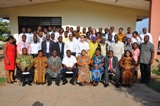
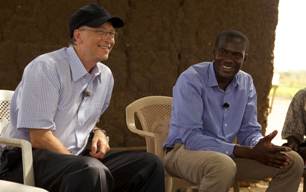 During his first ever visit to Ghana, Bill Gates joined the Partnership for Child Development to talk with smallholder farmers, teachers and caterers to better understand the issues and opportunities presented by Home Grown School Feeding (HGSF) programmes.
During his first ever visit to Ghana, Bill Gates joined the Partnership for Child Development to talk with smallholder farmers, teachers and caterers to better understand the issues and opportunities presented by Home Grown School Feeding (HGSF) programmes.
The Bill and Melinda Gates Foundation have been supporting the development of government-led, HGSF programmes since 2009. These nationally owned initiatives enable schools to procure the ingredients for their school meals from local smallholder farmers.
The benefits of programmes, such as the Ghana School Feeding Programme (GSFP), are felt by the school child and farmer alike with school children getting free nutritious hot meals whilst the farmer gets access to a regular market, providing a win-win for both education and economic development.
Read more: Bill Gates talks school feeding with Ghanaian farmers
A Dubai Cares team recently concluded a number of field visits to Ghana to monitor and evaluate its four year Home Grown School Feeding (HGSF) programme.
The aim of the US$2.7 million Dubai Cares funded programme launched in 2012, is to support the Ghana School Feeding Programme (GSFP) which impacts on 320,800 primary school children and 82,078 rural households, enhancing education prospects for children and providing farmer communities with reliable markets to sell their produce.
Tariq Al Gurg, Chief Executive Officer of Dubai Cares said: "This field visit to Ghana underlines our commitment to effective monitoring and evaluation that ensures a culture of continuous learning and greater impact. It also helps us maintain a close relationship with the communities we are supporting."
Read more: Dubai Cares visits Ghana to monitor & evaluate its HGSF programme
President of Ghana, John Dramani Mahama recently commended Mr Bill Gates, for his tremendous support to Ghana's school feeding and public healthcare system, (especially in the area of HIV/AIDS), which the Bill and Melinda Gates Foundation have supported.
Mr Bill Gates was in Ghana for a two-day working from March 25th to see some of the projects his Foundation are executing and to participate in an immunization tour.
President Mahama said the support from the Bill Gates' Foundation had helped to boost the nutritional needs of children and increase the number of children going to school, which has in fact, enabled Ghana to reach the universal enrolment level.
Read more: President Mahama commends Bill Gates for supporting Ghana
Page 2 of 4
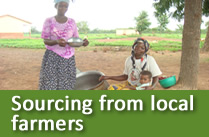 |
|||||
|
 |
|
From smallholder farmers to cooks and caterers to teachers and school-children, they comprise all elements of the school feeding supply chain and are integral to programme design and implementation. |
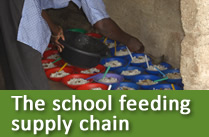 |
|||||
|
 |
|
|
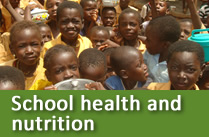 |
|||||
|
 |
|
|





